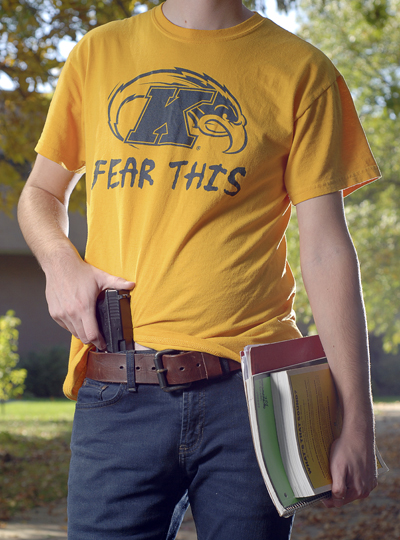Guns on campus? Local officials unsure of bill’s effectiveness

Photo illustration by Matt Hafley.
October 11, 2011
How a bill becomes a law
The Ohio General Assembly will soon examine a bill that would allow concealed weapons on college and university campuses.
House Bill 256 states a person with a concealed weapon license could carry in “public or private institutions of higher education, places of worship, day-care centers and homes and government buildings other than schools, courthouses, law enforcement offices, and correctional facilities.”
Ohio Rep. John Adams is the bill’s sole sponsor. Adams was unavailable for comment after multiple attempts to reach him.
The bill is still in its early stages. Ohio Rep. Kathleen Clyde, representative of Kent State’s respective district, said it’s been introduced, but it hasn’t received any hearings yet within a house subcommittee. Those hearings are the first step in making a bill law, she said.
It may come through the State Government and Elections Committee that she currently sits on, as did Senate Bill 17, the legislation that allows concealed weapons in bars and other places that serve alcohol. SB 17 went into effect Sept. 30.
Clyde said she’s not sold on the idea of allowing weapons on a college campus.
“I have some pretty serious concerns about it and will be interested in hearing what the witnesses have to say about why this is necessary legislation,” she said of the process, which involves listening to the testimony and opinion of the public.
new TWTR.Widget({
version: 2,
type: ‘search’,
search: ‘#kwguns’,
interval: 6000,
subject: ”,
width: 240,
height: 300,
theme: {
shell: {
background: ‘#b8b8b8’,
color: ‘#66a9c5’
},
tweets: {
background: ‘#b8b8b8’,
color: ‘#444444’,
links: ‘#1985b5’
}
},
features: {
scrollbar: true,
loop: true,
live: true,
hashtags: true,
timestamp: true,
avatars: true,
toptweets: true,
behavior: ‘default’
}
}).render().start();
She said she’s not sure how allowing weapons on campus would improve the safety and environment, but it’s something she’ll be looking in to when it comes through the house.
She’s also interested in hearing how Kent State students specifically feel about the bill.
“I thought about doing maybe a town hall meeting or something like that to try to get input and make sure we’re hearing from the people a policy like this would actually affect before we make an important decision,” she said.
William Lillich, Kent public safety director, said he also doesn’t know how the law would affect the atmosphere of public universities.
“I’ve got mixed feelings on that,” he said. “The school of thought is that (when the Virginia Tech Shootings occurred) if they had concealed carry permission down there then maybe somebody could have (prevented) that.”
But Lillich said he isn’t convinced that public intervention in these situations is enough to warrant policy like HB 256.
He added that owners of private establishments could still make their own rules regarding weapons.
“It’s also important to consider that private property still has the right to declare weapons off limits,” he said.
But public universities would still be required to follow state law.
Utah, for example, is the only state that requires public universities to allow concealed weapons on campus, according to the National Conference of State Legislatures. Twenty-five states leave it up to the individual universities and colleges, and 22, including Ohio, currently ban them completely. Two states have no concealed carry laws at all.
The University of Utah lost a lawsuit in 2006 when it tried to prohibit weapons on campus.
Remi Barron, media relations specialist for the University of Utah, wrote in an email that it remains permissive of concealed licensees’ right to carry on the university’s property.
“We lifted our ban, for those with permits, after the state legislature passed a new concealed carry law and the state Supreme Court upheld it,” Barron said. “We have had no issues on campus with regard to concealed weapons.”
Clyde said she is unsure of HB 256’s possible momentum, but thinks it could look very different by the time it reaches its final stages.
But that wasn’t the case with SB 17, which stayed largely the same throughout the process. She said having a Republican-controlled legislature, as Ohio currently does, has a lot to do with that.
“When you have one party rule like we do in Columbus right now … the process for bipartisan input is almost non-existent,” she said. “Sometimes bills change a lot because you need both sides to agree. Right now, we don’t really have that.”
But Clyde said she does understand why the state would be discussing campus violence prevention, though she’s not convinced the bill offers a safe solution.
“This is something that I am not sure is the answer to that problem,” Clyde said.
Contact Taylor Rogers at [email protected].
























